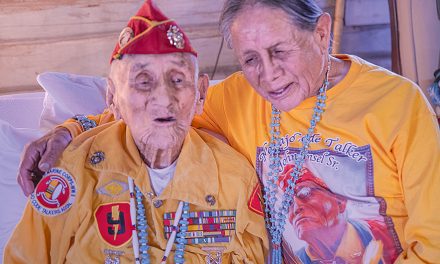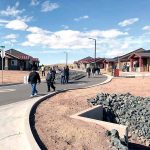
Letters: Animal welfare, responsible pet owners needed
After months of intense lockdowns and other pandemic-related interventions, the measures have had a considerable impact on COVID’s decline. While on the subject of public health, the discussion of free-roaming dog populations, both owned and stray, have a number of public health concerns, especially since the pet population continues to multiply without intervention.
Since 2011, the Navajo Nation has had five dog-related fatalities due to roaming packs of dogs. The most recent involving a 14-year-old from Fort Defiance, and the youngest, a three-year-old toddler, and multiple livestock attacks.
It is important to realize the contributing factors so that solutions can be implemented. Some of the contributing factors include the limited funding for the Animal Control program, lack of infrastructure, and the pervasive issues that surround poor pet ownership, responsibility, abuse, and suffering because dogs and other animals are not perceived, nor treated as sentient beings deserving of physical, emotional, environmental care and respect.
Animal fosters on the rez are plagued with the traumatic suffering of animals and the burden of finding medical care for animals in need as most dogs suffer through mange, ticks, parvo virus, broken legs, starvation, and other medical issues. Recently, dispatch was called to euthanize an animal because of a broken spine without knowledge of how long this animal had laid there in this state.
It is also important to understand that without the medical sterilization of spaying and neutering, the pet population increases drastically, and as the population increases so does the human-animal interaction in the communities due to non-existent leash laws, fencing, and the constant cycle of giving dogs away on local community pages where most dogs end up roaming and forming packs.
It becomes a cycle when those dogs are unwanted, or the small number of Animal Control officers round-up stray and unwanted animals and inhumanely kills them at an unnecessary rate of 10,000 per year.
Communities also face the safety issues of walking or playing in their neighborhoods with the chances of being chased or tormented. Livestock owners also face the loss when starving and roaming pack dogs attack their herds.
Furthermore, unvaccinated dogs carry illnesses that can be transmitted to humans and other animals through ticks, ringworm, rabies, bacteria, parvo, and distemper. This issue is not at the fault of the pet dog, the issue lies in the absence, neglect, abuse, and lack of responsibility of the owner.
Other contributing factors include breeding/selling, animal abandonment, unvaccinated animals, lack of appropriate animal shelters, the number of dogs exceeding household limits, animal abandonment, limiting cultural beliefs and perspectives, and the lack of fiscal understanding needed for owning a pet, and other animal welfare considerations.
The policy I am proposing under the name Mako’s Law seeks to adopt New Animal Welfare measures to protect stray, confiscated, or abandoned dogs (other animals not exempt), their welfare and keep our communities safe.
This also includes the adoption of new perspectives of dogs in our indigenous culture by the inclusion of living in harmony through the treatment of our animals as sentient beings that are deserving of humane treatment, value, and encouraging policies that are in consideration of their emotions, needs, and suffering.
But the question I ask the community and our leaders is, how many more deaths and livestock attacks will it take for measures to be enforced?
If tribes in Canada can adopt animal welfare measures and responsible pet ownership while still respecting cultural practices, so can we.
I have sent emails and a policy packet to the Office of the Navajo Nation president titled “Policy Proposal for ‘Makos Law.’” Please write in support for the provisions in that proposal.
In addition, you can sign the petition on both of my animal pages for the Navajo Rez, which can be found on Facebook: Mako’s Navajo Nation Pet Page, and Lost and Found Pets of the Navajo Nation.
Kelly DeJesus
Beaufort, S.C.
Look out for fraud, scams
Life is sometime worrisome. Fraud and scams are billion-dollar businesses.
On June 2, 2021, I received a text, which has “McAfee Pc Security AutoRenewal Order Placed” about $258.68 that will be charged to my account.
A phone number was given but it was not me. The area code is 818, which is California.
My children and grandchildren who live in the cities have warned me to just ignore those types of messages. My friend came over and I told her about what I received and she stated that I should call the FBI. So I decided today to submit a complaint to the Federal Trade Commission at www.ftc.gov/complaint, which I did.
The FTC’s mission is, “Protecting consumers and competition by preventing anticompetitive, deceptive, and unfair business practices through law enforcement, advocacy, and education without unduly burdening legitimate business activity.”
I copied an excerpt, which is given below of how FTC protects consumers.
“Protecting Consumers: The FTC protects consumers by stopping unfair, deceptive, or fraudulent practices in the marketplace. We conduct investigations, sue companies and people that violate the law, develop rules to ensure a vibrant marketplace, and educate consumers and businesses about their rights and responsibilities. We collect reports on hundreds of issues from data security and deceptive advertising to identity theft and Do Not Call violations, and make them available to law enforcement agencies worldwide for follow-up. Our experienced and motivated staff uses 21st century tools to anticipate — and respond to — changes in the marketplace.”
I am glad that I submitted my complaint to FTC and informed my bank about the text. I used to give my email address, but now I do not, unless I enter into a contract with the business or I use their services on a monthly basis.
I heard similar complaints and hope this letter will help anyone who needs it. Surround yourself with beauty.
Nancy Todea
Shiprock, N.M.
Cedar tree usage as medicine and protection
Gaad eh’ diyin doo ázee áteeh. Cedar is used as herbal medicine. It’s used in many types of Navajo traditional ceremonies that are held year-round. It is also used as a protection.
Our other brothers and sisters, Native Americans across the country, uses cedar in their traditional ceremonies as well. They also use it as medicine, too.
It is said that cedar tree is very strong and powerful. As we were growing up way back in the 1960s, I remember our parents in Dennehotso, Arizona, and other medicine people, have taught us that if you ever come across encountering a problem of any kind, do a simple cedar blessing short and sweet for yourself. Say a prayer to the Holy People (Mother Earth, Father Sky, Grandpa the Air, our Grandpa Fire, our Father the Sun, Water Lady — our mother, and the Sacred Mountain Lady — Our Mother); they will answer your prayer, it will restore your strength and clear the problem you were experiencing.
My late mother pointed out to us that cedar tree is very powerful and it’s evergreen, meaning that some and most leaves will fall off trees in the fall season. They freeze in the winter months when it’s cold. Then when spring comes again, they would bloom and green leaves will appear back on trees.
It can outlive any other type of plants and trees on earth. It strays strong and never dies. It will always stand straight and tall year-round way up there in a deep canyon high up in the mountain slope.
It will not freeze in a harsh winter season or when the rain hits hard with loud thunder and zooming lightening across the skies, it will still stand in the summer months.
In other words, it stands alone and it can survive against all odds. This is why it’s very tough and it doesn’t scare of anything. Its main purpose of usage is for protection; it draws away any negative thoughts that appear upon you.
If you’re all alone at home after dark when night comes through and become scared all of a sudden, you put a little pinch of cedar over a hot stove and when the smoke rises, bless yourself with it and say a short prayer. In a second, your mood will often change to the brighter side. Eventually, the scared feeling will vanish into air.
Another way it’s used as protection is traveling a long distance across the mountain areas when it’s snowing and driving on icy mountain roads. If you’re uneasy and jumpy with mind racing wild, thinking, “I hope I don’t slide off the winding road into the deep canyon.”
What you do then in is pull to the side of the road by a cedar tree. Then put a little pinch of cedar in your mouth, chew it a little, and bless yourself with it, or you can put a little pinch in the vehicle cigarette lighter, and once the smoke puffs up, inhale some smoke, and again, bless yourself with it, too.
Your mind racing wild and the thoughts of sliding off the road will stop in a heartbeat and you’ll arrive at your destination from the snowy mountain safe and sound.
This is why the Navajo (Diné) people and Native Americans use the cedar for protection and as medicine that was brought to us by the sacred Holy People in the beginning of time when they created us and put us on earth as human beings.
Again, cedar is used in almost all of the different ceremonies that are conducted and held on Navajoland across the rez.
The teaching of cedar tree usage as protection and medicine was brought to us by our late mother, Jean Black Todachine. Our cheii and masaní have used cedar for blessings and our forefathers before them.
I’m sharing this information to my people, young and old, across our land in the Four Sacred Mountain regions. Always be safe and take care as we all move on. Hagónéé.
Dan Todachine
Mariano Lake, N.M.








 Highway 264,
Highway 264, I-40, WB @ Winslow
I-40, WB @ Winslow